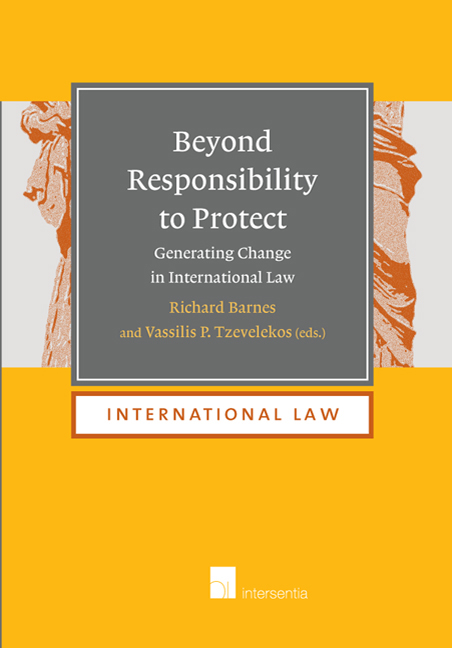Book contents
- Frontmatter
- Dedication
- Foreword
- Acknowledgements
- Contents
- Table of Cases
- List of Authors
- Introduction
- Part I The Moral Underpinnings and Political Ends of R2p
- Part II International Institutions And Their Role In R2p
- PART III De Facto Regimes and Non-State Actors Within a State And as a State
- Part IV R2p and Due Dilligence Regarding the Conduct of Corporations
- Part V The Interaction Between R2p And Humanitarian Law Obligations To Protect Civilian Populations
- PART VI R2p and International Criminal Law Beyond the Four R2p Crimes
- Part VII R2p and its Possible Impact on the Law of International Responsibility
- The ICJ Judgment in the Genocide Convention Case: Is R2P Drawing New Horizons for the Law on State Responsibility?
- Responsibility to Protect as a Basis for ‘Judicial Humanitarian Intervention’
- Military Commanders as Bystanders to International Crimes: A Responsibility to Protect?
- Commentary: R2P as a Transforming and Transformative Concept in the Context of Responsibility as Liability
- Part VIII Concluding Observations
- Index
Commentary: R2P as a Transforming and Transformative Concept in the Context of Responsibility as Liability
from Part VII - R2p and its Possible Impact on the Law of International Responsibility
Published online by Cambridge University Press: 19 September 2018
- Frontmatter
- Dedication
- Foreword
- Acknowledgements
- Contents
- Table of Cases
- List of Authors
- Introduction
- Part I The Moral Underpinnings and Political Ends of R2p
- Part II International Institutions And Their Role In R2p
- PART III De Facto Regimes and Non-State Actors Within a State And as a State
- Part IV R2p and Due Dilligence Regarding the Conduct of Corporations
- Part V The Interaction Between R2p And Humanitarian Law Obligations To Protect Civilian Populations
- PART VI R2p and International Criminal Law Beyond the Four R2p Crimes
- Part VII R2p and its Possible Impact on the Law of International Responsibility
- The ICJ Judgment in the Genocide Convention Case: Is R2P Drawing New Horizons for the Law on State Responsibility?
- Responsibility to Protect as a Basis for ‘Judicial Humanitarian Intervention’
- Military Commanders as Bystanders to International Crimes: A Responsibility to Protect?
- Commentary: R2P as a Transforming and Transformative Concept in the Context of Responsibility as Liability
- Part VIII Concluding Observations
- Index
Summary
INTRODUCTION
As the current volume illustrates, there is a lot of talk about R2P. Since its conception, R2P has infiltrated international legal thinking and is the epicentre of lively debates concerning its legal effect, scope and consequences.
R2P is construed primarily as the responsibility of the state towards its own population to protect them from serious human rights violations such as genocide, war crimes and crimes against humanity. Such responsibility emanates from the plethora of international human rights and humanitarian customary and conventional rules, which require the state not to commit these crimes but also to prevent them. In this respect, R2P brings under its umbrella primary norms, which dictate what states must and must not do. Nevertheless, R2P must also necessarily be understood as embodying certain secondary norms with the legal consequences that will arise for violation of the duty set out by the primary norms. It is now well established that such violation must be attributed to the state either through acts or omissions of its own organs and agents or through acts or omissions of entities and other states acting under its instructions or control.
In these respects, R2P does not entail anything new, or even, controversial. Rather, it seems to embody already existing principles relating to the obligations of states and the consequences of their wrongful acts. This coincides with what the editors of this book say about R2P as being ‘associated’ with the ‘shift’ that international human rights have brought about. To this effect, R2P is underpinned by ‘moral’ ideas and is the result of some relatively recent, albeit gradual, developments in international law. Such developments illustrate that law is a dynamic body of rules subject to change. International law is not an exception to this.
Such is the current transformation of the international legal order that international norms no longer only protect narrowly construed bilateral state interests but also interests owed to either a group of states (erga omnes partes) or the international community as a whole (erga omnes). This distinction between ‘ordinary’ and ‘significant’ norms derives from the now well-established obiter dictum of the International Court of Justice (ICJ) in the Barcelona Traction case, as well as from the concept of peremptory norms of international law.
Information
- Type
- Chapter
- Information
- Beyond Responsibility to ProtectGenerating Change in International Law, pp. 415 - 432Publisher: IntersentiaPrint publication year: 2016
